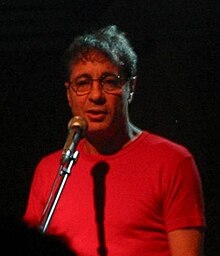| Revision as of 08:28, 29 April 2015 editKasparBot (talk | contribs)1,549,811 edits authority control moved to wikidata← Previous edit | Revision as of 06:57, 30 July 2015 edit undo84.228.52.140 (talk)No edit summaryNext edit → | ||
| Line 82: | Line 82: | ||
| == Biography == | == Biography == | ||
| Geffen was born in ] ]. He is the father of ], ] and Natasha Geffen, as well as |
Geffen was born in ] ]. He is the father of ], ]ת and Natasha Geffen, as well as nephew of ]. He has two grandsons. | ||
| In 1965, he served as a ] under ], and became an officer. | In 1965, he served as a ] under ], and became an officer. | ||
| In 1967, his mother overdosed on her medication and died. Geffen considers it to have been suicide. | In 1967, his mother overdosed on her medication and died. Geffen considers it to have been suicide. | ||
| After |
After his discharge from the IDF in 1969 and moving to ], he took up poetry. | ||
| In 1972, while Geffen was studying in London, his sister Nurit committed suicide, causing him to return to Tel Aviv. | In 1972, while Geffen was studying in London, his sister Nurit committed suicide, causing him to return to Tel Aviv. | ||
| During this period he began writing a column for the weekend supplement of |
During this period he began writing a column for the weekend supplement of '']'', and he joined the entertainment troupe "Lul" with ], ], and ]. The latter introduced Geffen to his future wife, Nurit Makober. | ||
| Geffen was often criticized for his strong ] leanings, which bordered on provocation, and even received death threats. He was one of a group of journalists (including ], ], ], ], ], and ]) who in 1973 published the book ''The Failure'', the first book to document the ]. It criticized the performance of the government and military and also contained first-hand descriptions of battles, casualties, injuries, and the losses and failures of military hardware. The book aroused considerable public interest. | |||
| Much of |
Much of Geffen's success came from his works for children, like the song "HaYalda Hachi Yafa BaGan" and the book "HaKeves HaShisha Asar" , but he has also written many popular songs, poems, plays, and stories for adults. He frequently collaborated with ], rendering Spanish songs into Hebrew. | ||
| ==References== | ==References== | ||
Revision as of 06:57, 30 July 2015
| This biography of a living person does not include any references or sources. Please help by adding reliable sources. Contentious material about living people that is unsourced or poorly sourced must be removed immediately. Find sources: "Yehonatan Geffen" – news · newspapers · books · scholar · JSTOR (November 2014) (Learn how and when to remove this message) |
| Yehonatan Geffen | |
|---|---|
 | |
| Born | (1947-02-22) February 22, 1947 (age 77) |
| Nationality | Israeli |
| Occupation(s) | Author, poet, songwriter, journalist, and playwright |
| Spouse | Nurit |
| Children | Aviv Geffen, Shira Geffen, and Natasha Geffen |
| Relatives | nephew of Moshe Dayan |
Yehonatan Geffen (Heb: יהונתן גפן; born on February 22, 1947) also known as Yonatan Gefen, is an Israeli author, poet, songwriter, journalist, and playwright.
Biography
Geffen was born in moshav Nahalal. He is the father of Aviv Geffen, Shira Geffenת and Natasha Geffen, as well as nephew of Moshe Dayan. He has two grandsons.
In 1965, he served as a paratrooper under Matan Vilnaì, and became an officer.
In 1967, his mother overdosed on her medication and died. Geffen considers it to have been suicide.
After his discharge from the IDF in 1969 and moving to Tel Aviv, he took up poetry.
In 1972, while Geffen was studying in London, his sister Nurit committed suicide, causing him to return to Tel Aviv.
During this period he began writing a column for the weekend supplement of Ma'ariv, and he joined the entertainment troupe "Lul" with Uri Zohar, Arik Einstein, and Shalom Hanoch. The latter introduced Geffen to his future wife, Nurit Makober.
Geffen was often criticized for his strong left-wing leanings, which bordered on provocation, and even received death threats. He was one of a group of journalists (including Uri Dan, Yeshayahu Ben Porat, Eitan Haber, Hezi Carmel, Eli Landau, and Eli Tavor) who in 1973 published the book The Failure, the first book to document the Yom Kippur War. It criticized the performance of the government and military and also contained first-hand descriptions of battles, casualties, injuries, and the losses and failures of military hardware. The book aroused considerable public interest.
Much of Geffen's success came from his works for children, like the song "HaYalda Hachi Yafa BaGan" and the book "HaKeves HaShisha Asar" , but he has also written many popular songs, poems, plays, and stories for adults. He frequently collaborated with David Broza, rendering Spanish songs into Hebrew.